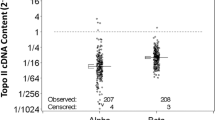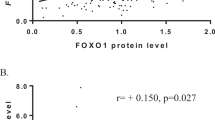Abstract
Topoisomerase II is a key target for several anti-cancer drugs used for breast cancer therapy, including doxorubicin, epirubicin and mitoxantrone. Two isoforms of topoisomerase II (alpha and beta) have been described in human cells which differ in their subcellular localisation, biochemical properties and susceptibility to inhibition by anti-cancer drugs. The relative level of expression of the alpha and beta isoforms may contribute to the degree of tumour responsiveness to different chemotherapeutic agents. To assess the relationship between expression of topoisomerase II isoforms and established prognostic factors and pathological variables, 56 primary breast tumour samples were studied. The expression of the two topoisomerase II genes was apparently not co-ordinately regulated in these tissue samples. There was no relationship between any of the commonly used pathological variables [tumour size, lymph node status, S-phase fraction (SPF)] and the level of expression of topoisomerase II beta mRNA. However, high topoisomerase II alpha gene expression was significantly associated with a high SPF (sign-rank test; P = 0.01). Moreover, the ratio of mRNA levels for topoisomerase II alpha and beta showed a stronger relationship to SPF (median raito 0.62 for tumours with SPF < 10, and 1.64 for SPF > 10; P = 0.0021, sign-rank test). As expected from previous studies, an SPF > 10 was associated with poor overall survival (P = 0.01). Immunohistochemical analysis revealed that topoisomerase II beta was widely distributed ( > 90% positive tumour cells), but that topoisomerase II alpha expression was less widely expressed, with a pattern of expression similar to that of the proliferation-dependent antigen recognised by Ki67. Because topoisomerase II gene expression showed a log-normal distribution, log-transformed data were used in multivariate analysis of relapse-free survival. This showed that lymph node status and topoisomerase II beta mRNA expression were the only significant survival factors (P = 0.001 and 0.05, respectively, with relative risks of 1.3 and 1.8). These results indicate that topoisomerase II alpha, but not beta, expression is dependent upon cellular proliferation status, but that the more widely expressed topoisomerase II beta protein may play a significant role as a target for anti-tumour therapy.
This is a preview of subscription content, access via your institution
Access options
Subscribe to this journal
Receive 24 print issues and online access
$259.00 per year
only $10.79 per issue
Buy this article
- Purchase on Springer Link
- Instant access to full article PDF
Prices may be subject to local taxes which are calculated during checkout
Similar content being viewed by others
Author information
Authors and Affiliations
Rights and permissions
About this article
Cite this article
Sandri, M., Hochhauser, D., Ayton, P. et al. Differential expression of the topoisomerase IIα and β genes in human breast cancers. Br J Cancer 73, 1518–1524 (1996). https://doi.org/10.1038/bjc.1996.286
Issue Date:
DOI: https://doi.org/10.1038/bjc.1996.286
This article is cited by
-
Dexrazoxane may prevent doxorubicin-induced DNA damage via depleting both Topoisomerase II isoforms
BMC Cancer (2014)
-
HER2 and TOP2A in high-risk early breast cancer patients treated with adjuvant epirubicin-based dose-dense sequential chemotherapy
Journal of Translational Medicine (2012)
-
Topoisomerase 2 alpha: a real predictor of anthracycline efficacy?
Clinical and Translational Oncology (2012)
-
Topoisomerase II alpha expression and the Ki-67 labeling index correlate with prognostic factors in estrogen receptor-positive and human epidermal growth factor type-2-negative breast cancer
Breast Cancer (2012)
-
DNA-AP sites generation by Etoposide in whole blood cells
BMC Cancer (2009)



